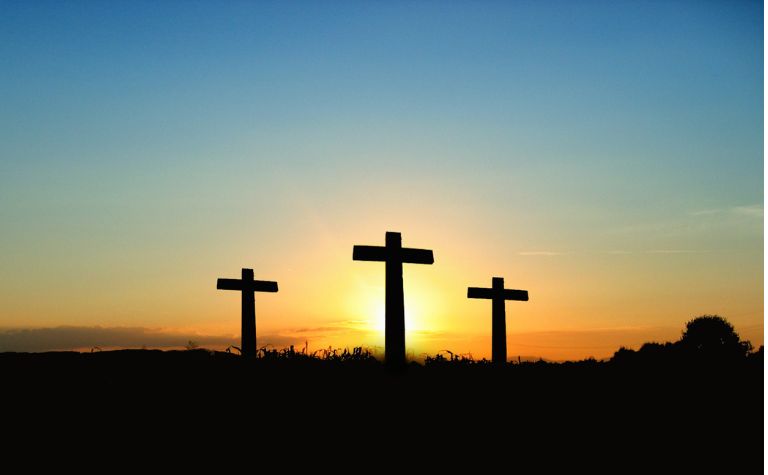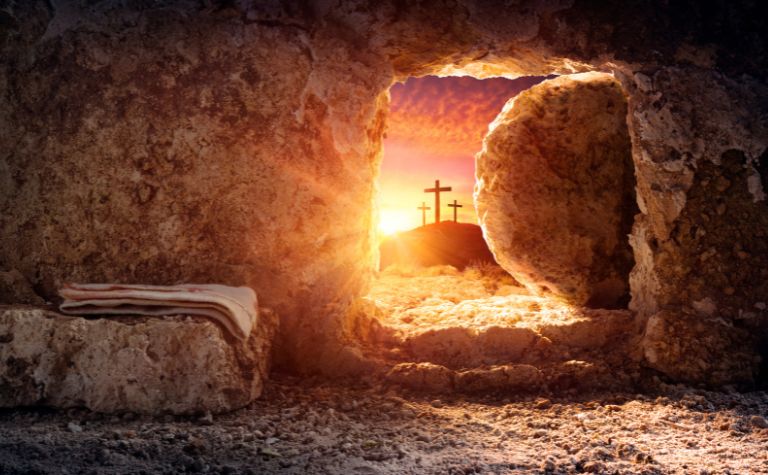The resurrection of Jesus Christ is the centerpiece of the Christian faith, according to the Apostle Paul (1 Cor. 15:17). Along with the crucifixion, the resurrection is the climactic moment of Matthew, Mark, Luke, and John. The Gospel writers mention the day Jesus rose from the dead, and Bible readers want to understand when it was.
Jesus Christ rose from the dead on Sunday morning, three days after he was crucified and buried. While the stories of the resurrection in the Gospels focus on when Jesus’ disciples discovered that his tomb was empty, he unambiguously prophesied that he would be dead for three days.
What did Jesus say about how long he would be dead? What did Paul say about how long Jesus was dead? What references in the Bible confuse people regarding what day Jesus rose? How did Jewish people count days in the first century? Do the Gospels record the moment of Jesus’ resurrection? Keep reading to learn the answers to these questions and others.
Also, see Why Did Jesus Descend Into Hell? to learn more.

Jesus Prophesied He Would Be Dead Three Days
The early church’s clear testimony is that Jesus died on Friday and rose the following Sunday. For example, 1 Corinthians 15:4 reads, “[Jesus] was buried, that He was raised on the third day according to the Scriptures.”
One of the references Paul may have had in mind is Hosea 6:2. “After two days he will revive us; on the third day he will raise us up, that we may live before him” (ESV).
Jesus said he would be dead for three days
In the Gospel of Mark (and in parallels in Matthew), Jesus refers to death three times. In each instance, he said he would be dead for three days. Many scholars call these references the “passion predictions” of Jesus. The Greek word translated as “rise” in each verse is anastenai (ἀναστῆναι), meaning “to rise from the dead.”
| Mark 8:31 | “And he began to teach them that the Son of Man must suffer many things and be rejected by the elders and the chief priests and the scribes and be killed, and after three days rise again.” |
| Mark 9:31 | “For he was teaching his disciples, saying to them, ‘The Son of Man is going to be delivered into the hands of men, and they will kill him. And when he is killed, after three days he will rise.'” |
| Mark 10:31 | “And they will mock him and spit on him, and flog him and kill him. And after three days he will rise.” |
On what day was Jesus crucified?
The majority of Bible scholars believe Jesus died on a Friday. The Last Supper occurred the day before (e.g., Matt. 26:20-30), and his resurrection occurred two days later on a Sunday (e.g., Matt. 28:1).
| Friday morning | Jesus appears before Pilate and Herod |
| Friday midday | Jesus is crucified |
| Friday midafternoon | Jesus dies |
| Friday near sundown | Jesus is buried |
Some people wonder if Jesus died Friday night and rose from the dead sometime Sunday morning before his followers arrived at the tomb, wouldn’t he have been dead for approximately 36 hours, not 72?
What’s important about understanding the phrase “three days” is how first-century Jewish people understood the term. A “day” can refer to any part of a day, not necessarily a 24-hour period. Therefore, Friday night is one “day,” Saturday is one “day,” and Sunday morning is one “day.” [1]
Also, see Why Did Jesus Come to Earth? to learn more.

Why Do Some People Question Jesus Rising On a Sunday?
One reason Bible readers question the day of Jesus’ resurrection is due to the KJV’s translation of Matthew 28:1, which reads, “In the end of the sabbath, as it began to dawn toward the first day of the week, came Mary Magdalene and the other Mary to see the sepulchre” (emphasis added).
The “end of the sabbath” was Saturday evening. Even though the rest of the verse clarifies that the women went to the tomb on “the first day of the week,” which is Sunday, the first phrase confuses some readers. The Greek word translated “in the end” or “after” is opse (oψὲ ), meaning “after” or “later.”
Other translations, including the NKJV, clarify the issue, rendering the Greek word “after the Sabbath,” as do the NIV, NASB, and ESV. Translating the Greek word “after” clarifies the confusion and aligns the statement with the action in the rest of the verse. The NLT agrees: “Early on Sunday morning…”
Another reason some Bible readers get confused is that Mark and Matthew have different descriptions of the evening after the Sabbath and early Sunday morning.
Mark starts his account on the evening after the Sabbath was over. “When the Sabbath was past, Mary Magdalene, Mary the mother of James, and Salome bought spices, so that they might go and anoint him” (Mark 16:1, ESV, emphasis added). Similarly, the NLT reads, “Saturday evening, when the Sabbath ended…”
Yet, even though the women purchased spices the previous night, Mark states that they didn’t go to Jesus’ tomb until Sunday morning. “And very early on the first day of the week, when the sun had risen, they went to the tomb” (Mark 16:2). The NLT agrees: “Very early on Sunday morning…”
Mark 16:2 aligns with Matthew 28:1, which reads, “Now after the Sabbath, toward the dawn of the first day of the week, Mary Magdalene and the other Mary went to see the tomb” (ESV). In the end, there is no disagreement between Mark and Matthew about when the disciples discovered the empty tomb.
Each Gospel writer uniquely recounts the day of Jesus’ resurrection. Yet, when read carefully, the narratives complement each other; they don’t contradict each other.
New Testament scholar Craig Blomberg writes, “All four Gospels agree that very early on Sunday morning a group of women headed for the tomb” (emphasis added). [2]
Similarly, Matthew commentator, R.T. France, writes, “As he has expressed it, Matthew refers, as the other three evangelists clearly do in different ways, to early on Sunday morning as it was getting light” (emphasis added). [3]
Also, see What Happened to Jesus after He Rose from the Dead? to learn more.

Do the Gospels Describe Jesus’ Resurrection?
The conclusion of the Gospels focuses on the disciples’ reactions to the empty tomb and the appearances Jesus made to them after he rose from the dead. No Gospel describes the moment Jesus rose from the dead and exited the tomb.
Nevertheless, Bible readers can be certain that Jesus rose on Sunday because he said he would in his “passion predictions,” which leaders in the early church, like Paul, affirmed (1 Cor. 15:4).
Also, see How Old Was Mary When Jesus Died? to learn more.
References:
[1] Mark by Mark Strauss. ZECNT. p. 364.
[2] Matthew by Craig Blomberg. NAC. p. 426.
[3] Matthew by R.T. France. NICNT. p. 1099.
Related Questions
Regular Bible reading is a valuable habit, as Scripture is God's message to people. However, the Bible's 66 distinct books, featuring various authors, settings, and themes, can make it challenging...
There are 66 individual books in the Bible. There are 39 in the Old Testament and 27 in the New Testament. Many readers can read the shortest books in the Bible in 5 to 10 minutes. The longest book...
